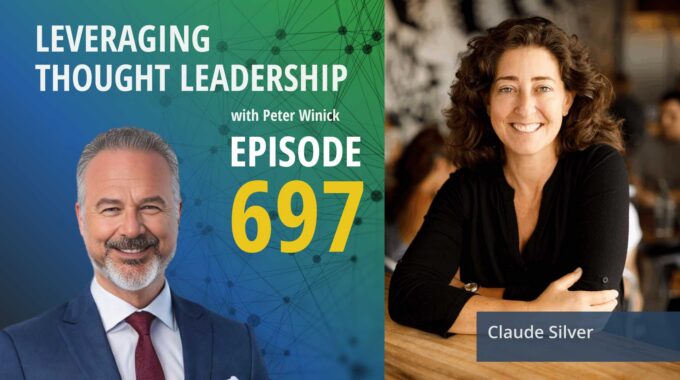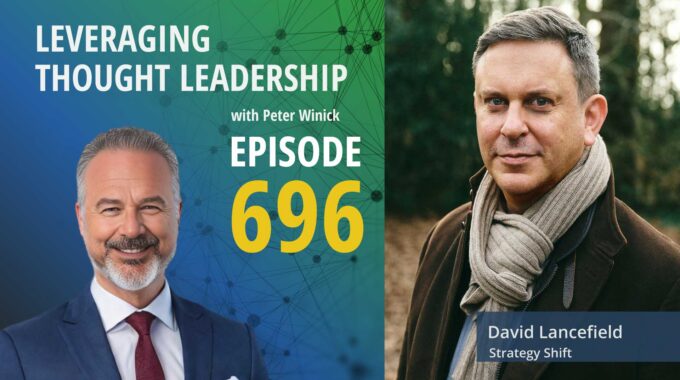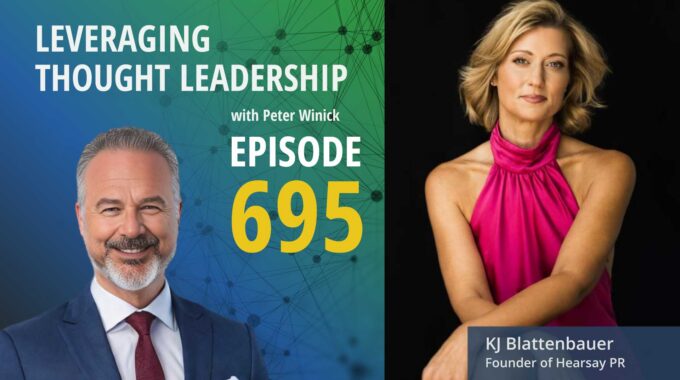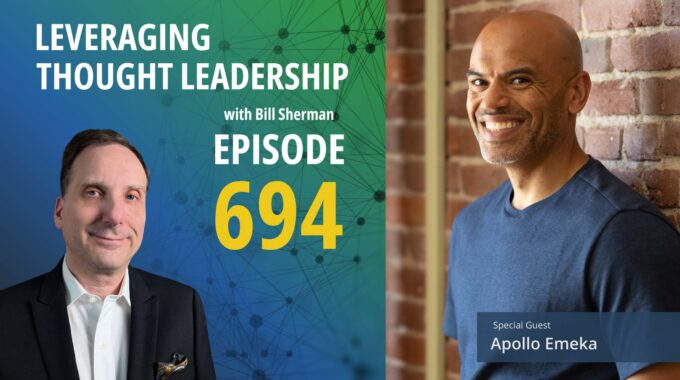Frameworks for connection, accountability, and performance This episode examines how psychological safety drives performance, how…
The Power of Storytelling in Science: Making Complex Topics Accessible | Bryan Quoc Le
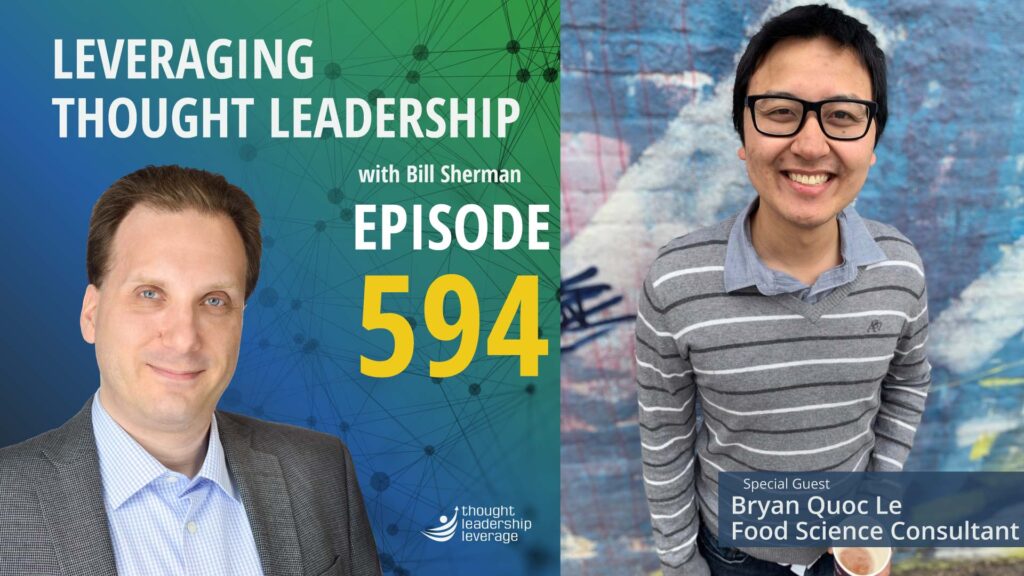
Building Credibility Through Community and Content Creation
In this episode Bryan Quoc Le shares how a volunteer position led to becoming a published author, supercharging his thought leadership career!
Join Bill Sherman as he sits down with Dr. Bryan Quoc Le, a dynamic food scientist, industry consultant, and the author of “150 Food Science Questions Answered: Cook Smarter, Cook Better.” In this episode, Bryan reveals how a seemingly ordinary graduate school project sparked his journey into thought leadership, leading him to unexpected opportunities and recognition in the food science world.
Bryan shares how he transformed a volunteer blogging stint at “The Institute of Food Technologists” into a platform that attracted the attention of Callisto Publishing, culminating in a book deal. Hear how he balanced the intense demands of writing his dissertation and authoring a book simultaneously, with the unwavering support of his wife. He dives into the book’s unique format—half dictated by the publisher and half crafted by him—and reflects on how it honed his ability to make complex scientific concepts accessible and engaging to a broader audience.
Learn how publishing a book early in his career became a game-changer, establishing his credibility and opening doors to numerous clients. Bryan talks about his unexpected success on platforms like Reddit, where he built a thriving community around food science, generating more leads and projects than he ever anticipated.
What’s next for Bryan? He’s exploring new creative frontiers, including a potential documentary on flavors with an Emmy-winning filmmaker. It’s a journey filled with innovation, exploration, and a bit of adventure.
Tune in to discover how thought leadership can evolve from unexpected beginnings and lead to extraordinary opportunities.
Three Key Takeaways:
Thought Leadership Can Start from Unexpected Places: Dr. Le’s journey into thought leadership began with a volunteer blogging opportunity that eventually led to a book deal. This shows that sometimes, the path to establishing yourself as a thought leader can start with a seemingly small or unplanned endeavor.
Publishing a Book Can Be a Powerful Credibility Booster: Dr. Le’s experience demonstrates the impact of publishing a book early in his career. It not only validated his expertise but also opened up multiple professional opportunities, establishing him as a trusted voice in the food science community.
Building Communities Can Lead to Unanticipated Opportunities: By actively engaging in platforms like Reddit, Dr. Le built a strong community around his field of expertise. This unexpected platform became a significant source of client leads and collaborations, highlighting the value of community-building in thought leadership.
As a food scientist Bryan knows the difference between fine flavor and junk food. When it comes to your business are you using gourmet metrics or just measuring the junk? Find out in this video with Peter Winick.
Transcript
Bill Sherman Have you ever thought about Reddit as a place for the practice of thought leadership? If you’re like me, you might not have. Today, I want to explore how thought leadership often starts in unexpected places, and how it can lift to you early in your career. My guest today is Doctor Brian Collette. He’s now a food scientist, a food industry consultant, and the author of 150 Food Science Questions Answered. Brian’s entry into thought leadership practice came through Reddit. We’ll talk about how he built a community while still in graduate school, how it led to an offer to write a book, and how that book influenced his career journey. So let’s take a look at Reddit and talk about thought leadership, filling gaps and creating communities.
Bill Sherman I’m Bill Sherman. This is leveraging thought leadership. Let’s begin. Welcome to the show, Brian.
Brian Quoc Le Thanks for having me. Really appreciate the opportunity, Bill.
Bill Sherman So. I want to start with a little bit of an origin piece for you. In terms of in grad school, you had a project that you were working on that wound up being the through line into thought leadership for you. So my question is, what was that side project in grad school?
Brian Quoc Le Yeah. So basically, I was, in my third year of graduate school, and I was quite bored. And so I decided to. I decided to, do, a little bit of volunteering for, nonprofit organization, called the Institute of Food Technologists. And they had a little blog that they needed help with. So I started contributing articles to it every so often, and I started to really enjoy that. And over time, I actually gained a lot of more leadership positions in that. And then I started writing the blog. And then eventually that led to a publisher recognizing, you know, some articles I had written and you, the traction I was building and the metrics that I was building on the blog. And eventually they, they offered to see if I’d like to write a book on food science. So.
Bill Sherman And so this happened soon after you received your PhD. Not mid-career that a publisher came looking for you. Right.
Brian Quoc Le Funny enough, it was actually before I received my PhD. Really? Yeah, actually, I got I got the offer to write a book right in the last year, right before I was finishing up my dissertation. So it was actually quite of a wild ride to have to write both the dissertation and the book the same time.
Bill Sherman Okay, so you’re Abdi and under contract writing a book, and this was in 2020, wasn’t it?
Brian Quoc Le That’s right, that’s right.
Bill Sherman So this is how you spent your pandemic in some ways. Right. And, you know, took up a lot of writing. Yeah. I all that extra.
Brian Quoc Le Time when I did years you know, and it was I likely had the blessing of my wife, who was very encouraging of me to do my dissertation during the day and write my book during the night in elevator. And so I thank her for her sacrifice.
Bill Sherman So couple things I want to explore on the book you mentioned at the publisher sort you out because of the block work on that. And so you weren’t thinking of writing a book at this point, right?
Brian Quoc Le No, I mean, I was really just thinking, oh man, I maybe five, ten years down the line, maybe I have some experience I wrote about. I’ll pitch something. Maybe, you know, I’ll give it a try. The good old college try. But yeah, just out of the blue, they found the blog. They saw that I was, you know, building up quite a bit of an audience because I was, you know, optimizing the blog. Yeah, I this is all my spare time. I wasn’t being paid to do any of this. It was just for fun. Yeah. This is how bad it was as far as trying to get away from doing the PhD work. And so yeah, I, I was doing keywords and all that sort of thing.
Bill Sherman Well, and I’ve heard many a story. PhD candidates who have found different ways to distract themselves rather than writing the dissertation. Getting a publisher to pursue them is a new one for me and my coworkers. Did they have a topic in mind for you, or did they say, hey, we’d like you to write a book? What might you write?
Brian Quoc Le Yeah. So they actually they had it structured it in sort of a question answer response way, where they had formulated the first 75 questions, kind of gather from different surveys. And then for me, I just had to finish the other 75 and answer all the questions that were compiled. So they had a structure in mind. And they I think it was based on an outline that they had a lot of success with, with their previous books. So it was kind of a plug and play scenario.
Bill Sherman And so in this case, this is a book written for a popular audience, you know? And so you entered the world of science communicator and science translator. Was that sort of what you were thinking you do posting Ph.D. or….
Brian Quoc Le Oh my gosh, I had no idea what I was going to do. But honestly, it was just it was just kind of play around with the things I really enjoyed. And I honestly never thought I’d be a writer. I always that kid that that really struggled at English, as you know. And you can I get attached to all my I’m sure my English teachers are surprised that I have. You had written a book. So it was it. It wasn’t on my radar, but I, you know, over time, you realize there are a lot of skills that you can build up if you just apply yourself. And that was one of the things I really developed was as I was writing more blog articles and really getting into the nuance of like, how do I translate this information that’s very verbose, very technical, and turn it into something that’s readable? It became so a craft I developed, and it really started with me trying to explain things to my wife. She’s not a scientist. She’s a psychotherapist. And she has a strong humanities background. She loves reading. And I had the challenge of, like, how do I explain things to my wife? And eventually I cracked the code to make.
Bill Sherman Sure I knew. Well. So there’s a journey there, right? In terms of taking academic literature and translating it for a lit review and doing your study for the PhD, and then being able to say, how do I turn this into something that’s accessible for a generally educated layperson, right, where, let’s say, have a wide array of knowledge, but not the technical specialty?
Brian Quoc Le Right, right. Yeah, definitely. There’s a lot of nuance there. As far as you know, you can’t talk over a person, right? Yeah. Yeah. They’re just as intelligent as you. They have education, different skills in different areas and focus. But you know, you’re also trying to get the meat of it and try it and get it over. You know, the hurdle of, am I get to sit here and be bored by this guy talking, right, or whatever it is, and writing.
Bill Sherman Well, and I can see having your wife as sort of the sounding board and where you develop that skill, respect certainly is something that you want to signal over the dinner table. Otherwise that’s just not going to go well over the longer term of the okay, I roll. I asked you a question and you came back and talked to me, you know, like I was a second grader. That just doesn’t work, right. He. So the book comes out and is published. My question for you is how has having a book published early in your career impacted your career? What doors have opened?
Brian Quoc Le Yeah, it was really funny because even before I was done with the book, people were starting to hear that I was writing book. You know, this is through the grapevine. I was telling my family, my friends, and eventually they were telling their friends. And, you know, through all this, I actually got my first client from my cousin who, she knew someone that was working for, food company, a flavor company. And they wanted me to write some technical documents, you know, and I was like, oh, I guess this this could be something I could do, you know? And in the meantime, I’m trying to figure things out. And then, you know, eventually, once the book got published, it just sort of had this snowball effect because it validated that I am this person that, you know, someone put the chips on the table for, you know, they said, hey, you know, like, here’s, here’s some money, write this book. So there’s that. And then a second piece is that they could see that there is evidence that I had completed something. And so those two signals allowed me to convey a lot of value upfront to a lot of potential clients. I’d just email people and say, hey, you know, I wrote this book and, you know, I can do some writing. If you got anything up on the table. And I ended up being able to get a lot of long-term clients in that first year just because of that.
Bill Sherman So you open doors because of your ability to write. But you are also a food scientist. And so have you been doing lab work as well? And how has the ability to have the book as an asset for yourself impacted your career on that side?
Brian Quoc Le Yeah, I mean, once I started kind of building up my name, people started reaching out to me for product development work, for research and development work. And somehow it was the fact that I had this knowledge base, but also that I could read and explain it. I became really valuable because people didn’t want to work with someone that was going to, you know, use a lot of terms or be very technical and get into the weeds. They wanted someone that could explain things quickly and succinctly, and I was able to do that because it was just sort of a natural way of speaking. I just learned that that was just the way I know how to translate things. And so people became more comfortable with the types of projects I could pitch. I’d say, hey, let’s work on this. Like, I can do this, I can develop this product, you know, this is how I’m going to do it. And very, in very layman’s terms, they’d be like, oh, sure, that sounds great. You know, there’s a lot of there’s a lot of opportunity there. And so it was being able to deliver a lot of information in a very short amount of time in my proposals in, you know, the small communications in the emails, over meetings and, and just make people feel really comfortable about the fact that they’re in good hands because, you know, I wasn’t trying to speak over them. I wasn’t trying to, you know, over communicate. I was just trying to get as much information as possible so that they could do what they do best, which is the business side, the marketing side, you know, whatever it was.
Bill Sherman If you’re enjoying this episode of Leveraging Thought Leadership, please make sure to subscribe. If you’d like to help spread the word about our podcast, please leave a five-star review at ratethispodcast.com/ltl and share it with your friends. We’re available on Apple Podcasts and on all major listening apps as well as thoughtleadershipleverage.com forward slash podcasts. So let me ask you this question. If that opportunity on the book hadn’t come while you were working on your dissertation. How do you think your career would have been different?
Brian Quoc Le I probably wouldn’t be where I’m at right now. I don’t know if I would be able to do this consulting. You know this one man show. I think I would probably have to find a job or position, because I wouldn’t have been able to easily and quickly deliver. You know, that signaling that messaging of this guy knows this stuff and credibility.
Bill Sherman So it was an early career enhancer for you?
Brian Quoc Le Oh, absolutely. It was a catalyst for a lot of new opportunities. It just kept snowballing. You know, like the more credibility I built, the more clients I had under my belt. People began saying that I could do what I said I did, and there’d be testimonials coming out of the lawsuit. You know, and just because of having that book under my belt, it just caught it all together.
Bill Sherman So that’s a great setup for the question I want to ask you in terms of when did you realize you were practicing thought leadership and getting pulled into this world? Yeah.
Brian Quoc Le I think what happened was after I got my book published, it was crickets all around. So there was enough of a lot of the interest came through that sort of word of mouth, but it didn’t come through any or active marketing or anything like that.
Bill Sherman And Good Morning America wasn’t calling no spot. Yeah.
Brian Quoc Le No, no, none of that. No, no, no news coverage. Right. And so it dawned on me that I needed to amplify the message myself. Right. And so I started actually reading up about books on thought leadership and, about guerilla marketing and, you know, building up a platform and that sort of thing. And I experimented with a lot of different avenues and different approaches. You know, I started with social media. Everyone starts with social media, right?
Bill Sherman Yeah. It’s a low risk, low end, low cost of.
Brian Quoc Le Exactly, exactly. But I am terrible at, you know, I don’t like those photos. I have no clue how to like, build a story with your six seconds segments. It’s not it’s not my thing.
Bill Sherman For you would be the ideal person to be taking pictures of food and restaurants and then it kind of planning what we’re seeing, right. And from a food science perspective, that would be a totally different sort of food Instagram influencer perspective.
Brian Quoc Le That’s funny. Yeah. I mean, my wife kept pitching it because we would just sit down and have dinner. Yeah. The right. So she said, you know, you should really post this on your Instagram. And I’m just thinking like, I’ve so I’ve, it’s just it’s just not in me, you know like and I think I would it would been a real uphill battle to like make to turn my personality into something that was presentable and would actually return on the investment of time and energy.
Bill Sherman And from a thought leadership perspective, I often think about a two by two matrix. One what modalities are easy for you and hard for you? Okay, and so if Instagram is a hard modality for you. The other axis is where’s your audience? If your audience were there and that were the way that you had to reach them, then you find a way. But if there are other ways to reach your target audience, and that’s a hard modality. Okay. Set that one aside.
Brian Quoc Le Yeah, yeah. And, you know, what ended up happening was that I accidentally fell into this situation where I began writing, a group on Reddit. Because I had spent so much time. It was just me, you know, again, procrastinating and, you know, trying to find a way not to do my PhD, but I ended up just running this, this subreddit group on food science.
Bill Sherman Which is called.
Brian Quoc Le Our food science.
Bill Sherman So and let’s talk about who’s on that Reddit group and sort of the conversations that happen there.
Brian Quoc Le Yeah, definitely. You know got it. Start off with 10,000 members. And it’s grown over time in the last couple of years to 34,000 members. And a lot of them are food scientists, you know, just people who want to volunteer their time, explain things to, you know, lay audiences. There’s people who come in, there might be business people, there might be investors. They might just be, you know, random folks who are just really interested and passionate about food science. They might not even have a science background, but they’ll ask questions and people pop up and want to answer them. And they come from the industry. And my goal is really to get out of everyone’s way and try to manage these conversations so that, you know, people get the most value out of them. And because my name is always, you know, shooting up on the, you know, on the group, as I’m posting and providing my own answers, people have reached out to me directly for projects and I and it was it wasn’t something I thought, this is where I’m going to get fired. I actually for a longest time I thought, this is the worst place to get ahead, because.
Bill Sherman It’s not it’s so it was.
Brian Quoc Le Such a personal project for me. I was not interested in necessarily trying to maximize my time on that, and it was just something I did, for fun. And then now, because of the, you know, the amount of things I do for the group, I people refer me, I get, you know, industry professionals that say, hey, check out talk to Brian, my business consultant. He knows what he’s talking about. And so there’s a builds credibility in there as well, in that space. And of course, my book has played into that so.
Bill Sherman Well, there’s building a personal brand, creating a community space, nurturing it and supporting it, and creating a space which allows all the accredited professionals as well as a lay audience, to come together and have a conversation. That’s a special space to create and to get the professionals to want to come and go. Yeah, let’s go read the questions in the comments, because mostly on the internet, that’s sort of like the rule not to do was read on. Let’s go inside. Like he said. Great. Yeah. So you’ve been building and nurturing communities. You’ve been taking scientific concepts and making them accessible. We’ll ask you a question. Where does this going? What’s next? What’s next? Well.
Brian Quoc Le That’s, you know, there there’s been there’s a few hills along the way. I’ve tried to, you know, step up and see beyond. But I think it’s all just sort of. Things just come to me, and I take the opportunities where I can, ultimately, for example, I, I talking to this filmmaker who. Yeah, who’s won an Emmy in the past, and he’s really interested in doing a documentary about flavors. And I’m like, yes, please. Like that. I love that because I’m in that space. I want to I want to convey that to a general audience. And, you know, I it might and who knows what will come out of it. But for me, it’s just about the creativity and the adventure of trying to do, you know, this work of being this independent consultant and creating a message and creating these stories for people.
Bill Sherman So you mentioned creating a platform. And one of the things that we see and thought leadership is often to be known for a perspective or an area of expertise, which is how we define a platform rather than, you know, a technology platform, anything. Have you landed on your platform yet in terms of what you want people to know and refer you for?
Brian Quoc Le Yes. Yes, absolutely. I am the guy who knows savory flavors. It’s nice. Yeah. So, you know back.
Bill Sherman To your dissertation work with us. And so now I’ve actually.
Brian Quoc Le Come full circle. It took me a while, but I. I managed to build it up. You know, if you need to know anything about who. Mommy, I I’m the guy. Because I’ve got hundreds and hundreds of papers that I, again use to procrastinate from my PhD. Yeah. Now, given the value in the market space. So people now come to me for that, that kind of advice.
Bill Sherman Fantastic and that what I love about that is within the world of food science. It is specific. It is clear. And it answers the Ghostbusters question of who you’re going to call and why. And this is why I pick up the phone to talk to Brian, rather than one of 100 other food scientists. Yep.
Brian Quoc Le Yep. Absolutely, absolutely.
Bill Sherman So is there a cookbook in Richard?
Brian Quoc Le Gosh, you know, I’ve been playing around with the idea. Maybe, maybe I just have to sit down and think about how to how to spin it in a way that that works in my favor, you know, because a lot of the time, pet books are huge, huge use of time and energy. And, you know, you have to understand how you’re going to use that to sell your services. And I want to make sure I stay in my lane. I realize that, you know, if if I’m able to just maximize my messaging in the best possible way, it might be a cookbook, it might be a notebook. We’ll see. We’ll just have to see.
Bill Sherman Well, whether we see you at a film festival or on the bookshelf or on Instagram, I want to thank you for joining us, Bryan, today and having a conversation about your work and thought leadership.
Brian Quoc Le Thank you so much, Bill. It’s been a pleasure.
Bill Sherman Okay. You’ve made it to the end of the episode, and that means you’re probably someone deeply interested in thought leadership. Want to learn even more? Here are three recommendations. First, check out the back catalog of our podcast episodes. There are a lot of great conversations with people at the top of their game, and thought leadership, as well as just starting out. Second, subscribe to our newsletter that talks about the business of thought leadership. And finally, feel free to reach out to me. My day job is helping people with big insights. Take them to scale through the practice of thought leadership. Maybe you’re looking for strategy, or maybe you want to polish up your ideas or even create new products and offerings. I’d love to chat with you. Thanks for listening.


